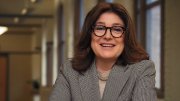During Nicole Maestas’s Napa Valley childhood, everything was grapes. Though her father worked in the wine finance business, the future MacArthur professor of economics and health care policy showed interest in neither farming nor money. At Wellesley College, she studied English. After graduation, the Bay Area beckoned. There, she met her husband in a community jazz band (she played alto sax, he electric bass). While researching education policy, she became fascinated with “poverty policy,” which led to an M.P.P. at the University of California, Berkeley. Economics, she thought, provided the best analysis of America’s social safety net, and her master’s developed into an economics Ph.D. Her dissertation, advised by labor economist and future Nobel Prize winner David Card, analyzed couples’ joint retirement behavior—women retire earlier, leaving the workforce alongside their (generally older) husbands. After Berkeley, Maestas joined the nonprofit research organization RAND Corporation, primarily studying disability insurance, retirement economics, and health economics. Some of her work there differed from traditional academia: a six-month consulting contract for the Social Security Administration gave her an insider’s insight into the sprawling organization. In 2015, she joined Harvard Medical School’s department of healthcare policy, becoming its chair in November 2024. Recently, she began investigating enrollment declines in disability insurance, which have dropped more than expected as baby boomers age out. She believes the program, fearing fraud, overcorrected and may be excluding eligible working-age adults. When not researching, Maestas can be found in her backyard vegetable garden, a COVID-era project that now includes onions, cabbage, eggplants, and flowers: dahlias, asters, and many others. (It also inadvertently houses a rabbit family.) After she harvests, her husband cooks the veggies for her and their three children, adopted from Guatemala. Though Maestas once spurned farming and money, the economist now treasures her time in the weeds.
Harvard Economist Nicole Maestas on Aging and Health Policy
Harvard Economist Nicole Maestas on Aging and Health Policy
The Harvard health economist not afraid to get in the weeds

Health economist Nicole Maestas, who studies gender, aging, and disability in the workforce | Photograph by Stu Rosner
You might also like
Eating for the Holidays, the Planet, and Your Heart
“Sustainable eating,” and healthy recipes you can prepare for the holidays.
Five Questions with Michèle Duguay
A Harvard scholar of music theory on how streaming services have changed the experience of music
Harvard Faculty Discuss Tenure Denials
New data show a shift in when, in the process, rejections occur
Most popular
Explore More From Current Issue

Inside Harvard’s Most Egalitarian School
The Extension School is open to everyone. Expect to work—hard.

How a Harvard Hockey Legend Became a Needlepoint Artist
Joe Bertagna’s retirement project recreates figures from Boston sports history.

At Harvard’s Beck-Warren House, Ghosts Speak Many Languages
The quirky 1833 home now hosts Celtic scholars.





